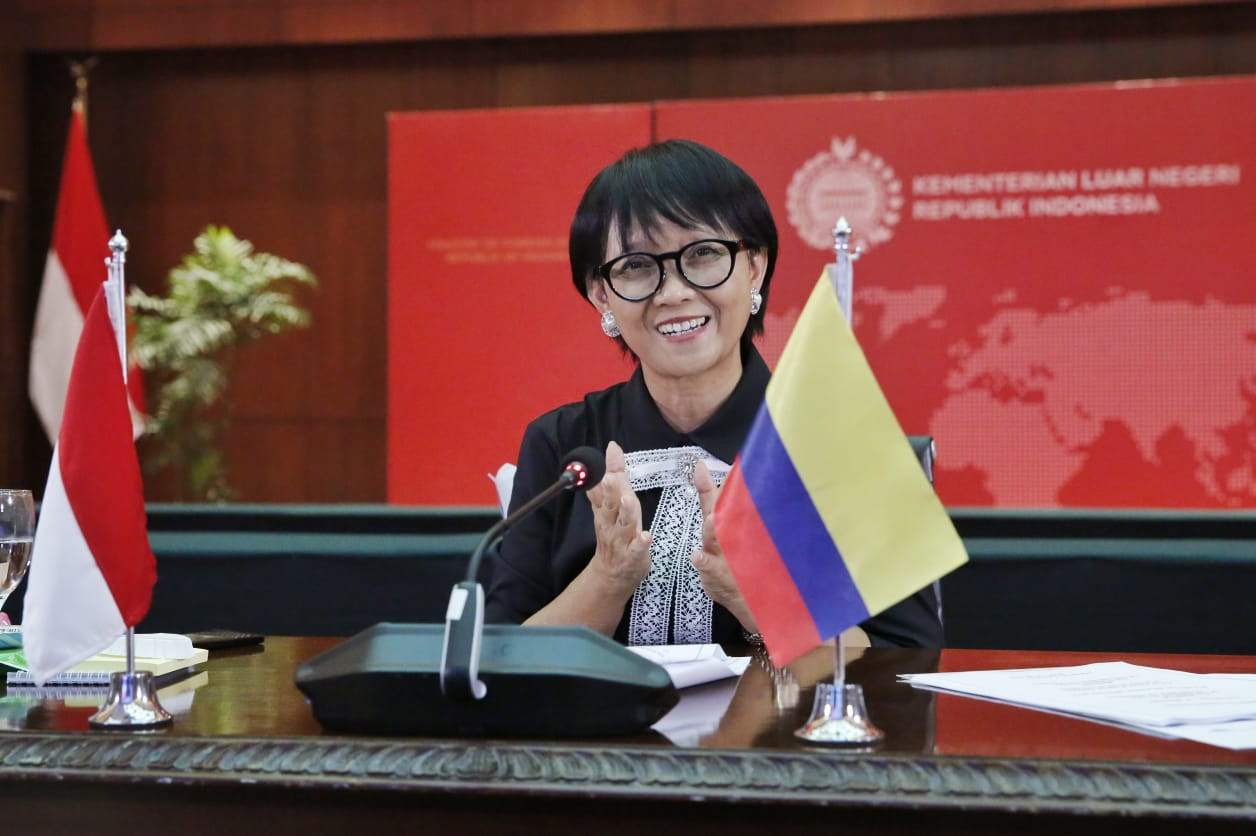Discourse: Indonesia’s diplomacy seeks global efforts to fight pandemic
Indonesia will remain steadfast in its free and active foreign policy. All great powers are important and strategic partners for Indonesia. We will not allow ourselves to be forced to take sides.
Change Size

M
em>Multilateralism is facing an uphill battle during the COVID-19 pandemic, which to some extent has prompted nations to pursue their own interests, rather than common ones. Foreign Minister Retno LP Marsudi recently talked with The Jakarta Post’s deputy editor-in-chief M. Taufiqurrahman about Indonesia’s diplomacy during the pandemic and endeavors to promote multilateralism.
Question: How has the pandemic affected relations between great powers and how will Indonesia’s diplomacy respond to these rivalries?
Indonesia will remain steadfast in its free and active foreign policy. All great powers are important and strategic partners for Indonesia. We will not allow ourselves to be forced to take sides.
Indonesia will consistently urge all parties to refrain from provocative rhetoric and action, intensify dialogue, and peacefully settle their differences. It sounds very cliché but I continue to convey this message to our partners.
Southeast Asia must remain a region of peace, freedom and neutrality and I convey this to my ASEAN foreign minister colleagues in line with the spirit of the ZOPFAN [Zone of Peace, Freedom and Neutrality] declaration. Our neighbors and partners must continue to uphold the principle enshrined in the Treaty of Amity and Cooperation.
Indonesia will also continue promoting the ASEAN Outlook on the Indo-Pacific to ensure the regional dynamics contribute to regional peace, security and prosperity. This is especially important as we are recovering from the impact of COVID-19 pandemic.
What is your view regarding weakening trust in multilateralism and how can we rebuild it?
We are going to celebrate the 75th anniversary of the United Nations, and this is an opportunity for us to push a reform, and developing countries must have a say on this reform.
Indonesia continues to believe in the virtue of multilateralism. I recalled in April, Indonesia co-initiated the UN General Assembly resolution on global solidarity to fight against COVID-19, which underlined the role of the UN.
Last month, the UN Security Council unanimously adopted Resolution No. 2532 after such a long process. [The resolution] demanded immediate cessation of hostilities in all conflict situations and a humanitarian pause in all situations in its agenda and support undertaken by the [UN] secretary-general and his special representatives and special envoys.
How has Indonesia capitalized on its membership in some UN bodies to promote international cooperation against COVID-19?
This month, Indonesia holds the presidency of the UN Security Council. One of the signature events of our presidency will be a high-level open debate on the pandemic and challenges in sustaining peace. It will explore how the council can do better to support conflict-impacted countries during this pandemic.
At the UN Human Rights Council, the council president adopted a statement on the human rights implications of the COVID-19 pandemic. It involves the Indonesian proposal on the importance of equitable access to health products especially diagnostics, therapeutics and vaccines.
Next year, Indonesia will become a member of the UN Economic and Social Council. We will use it as a platform to promote economic recovery.
How has this pandemic changed the way Indonesia conducts diplomacy?
We have had no option but to adjust our foreign policy. On top of the existing 4+1 priorities, there are several immediate priorities.
First, protection of Indonesian citizens abroad. This includes ensuring those who are infected receive appropriate care and facilitating their voluntary return to Indonesia.
Second, filling the shortages of medicine and medical supplies, as well as supporting the development of potential vaccines.
Third, economic recovery. Our foreign policy must work to support this and it is a daunting task for every diplomat now. Due to the pandemic, we don’t convene to traditional diplomacy; diplomats are the ones who should adapt and enhance their knowledge regarding the matter.
What is your view on the impact of COVID-19 on women? Is there a role for women to play in addressing this pandemic and its impacts?
This issue has been regularly discussed at female foreign minister meetings. I have always underlined the need for hitting the reset button in our approach. Any interventions, any policies must always consider both women's vulnerabilities and the potential, so providing protection and involving women is part of the solution.
First, the pandemic has disproportionately affected certain vulnerable groups including women. Many do not have sustainable incomes in the informal sector and are deprived of access to social protection schemes, proper health care and much of the socioeconomic stimulus provided by the government. At the same time, isolating at home during the pandemic has reportedly increased their vulnerability to domestic violence.
Second, women can be an important part of the solution. Women make up more than 70 percent of global medical workers. In Indonesia, women own more than 64 percent of micro, small and medium Enterprises. Many of them diversified business during the pandemic to produce masks, protective gear and other things.
In your opinion, what are the key issues for Indonesia’s economic recovery?
There are three issues that need to be highlighted. First, it is important for countries to keep the markets open for investment. Non-tariff barriers that hinder the movement of goods and services must be lifted. Indonesia was constantly delivering this message in the first few months of the pandemic.
Second, the travel bubble may hold the key to reactivating economic and business relations between countries. Many countries have explored this as they relax restrictions of movement and gradually open their borders, but not at the expense of health.
Third, economic integration – regional comprehensive economic partnerships (RCEP) included. Indonesia has been underlining the importance of signing an RCEP at the ASEAN Summit this year.









